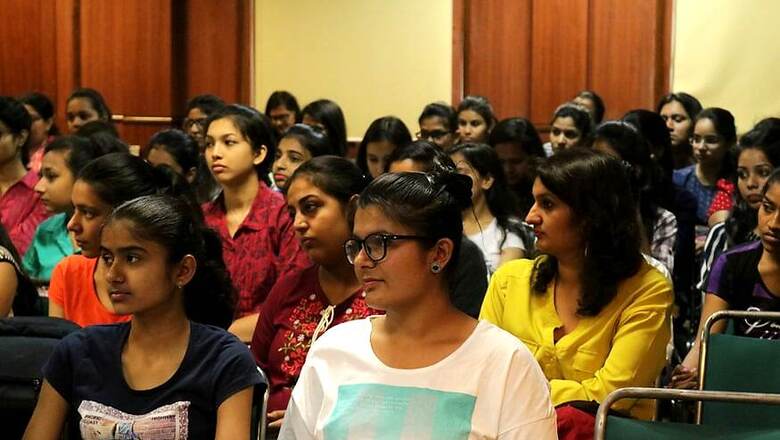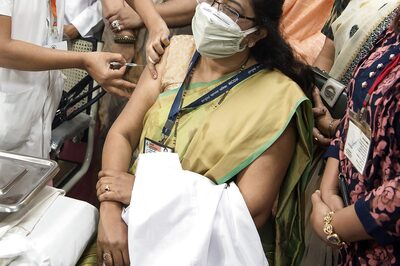
views
New Delhi: Indian students planning to appear for entrance exams such as GRE, GMAT, TOEFL in order to get through to foreign universities are now planning to drop a year. Most of these tests are not available currently due to the global spread of novel coronavirus.
Many foreign countries are currently under complete lockdown to contain the spread of the virus with no specific deadlines.
India is the world’s second-largest source of international students only after China and one of the fastest-growing sending markets. Last year more than 7.5 lakh students went abroad for further studies.
This year, however, the numbers are expected to be extremely low.
Most Indian aspirants, especially those aiming for spring 2021 and fall 2021 have not been able to appear for standardised tests such as GRE, GMAT, SAT, ACT, IELTS, among others.
One such English proficiency exam, TOEFL is not available for even home test for Indian students till 11 April. Similar is the case for Graduate Record Examination (GRE), a standardised test that is an admissions requirement for many graduate schools in the United States and Canada.
In the case of Graduate Management Admission Test (GMAT) -- used for admission to a graduate management program -- no further dates have been announced post its cancellation.
Standardised tests for undergraduate admissions such as SAT and ACT have also been pushed to June and experts are of the opinion that they may be further delay given the slim chances of Covid-19 being under complete control by then.
'Will have to waste a year'
Prerna Singh, a resident of New Delhi was planning to take the Scholastic Assessment Test (SAT), an entrance exam used by most colleges and universities in the US, Canada as well as other countries to select students for admissions to undergraduate courses.
She wants to pursue a bachelors degree in commerce at University of Toronto.
"My teachers are also advising me to not go for foreign universities this time. Students from abroad have had to come back to India because of the global pandemic. I will probably have to wait for all of this to settle down but in the process will have to waste a complete academic year," said the 17-year-old.
5.6 lakh Indian students, on an average, take the SAT exam every year.
For 18-year-old Rishabh Kumar, a resident of Kolkata, this was going to be a second attempt at cracking the GMAT exam. As of now, he may have to "prepare for the third time."
Though the exam fee has been waived, Kumar had pay close to Rs 25,000 for his preparation.
He had not taken up any job hoping he'd get through this time. With exams being postponed and the Indian economy along with the job market crumbling because of the coronavirus jolt, it is going to be a double whammy for Kumar.
"When the virus broke out in China, I was hopeful that it would not spread in European countries and India. But it caused havoc. I will not be able to go for my further studies this year and I am sure finding a job will be equally difficult. I am planning to do odd jobs like teaching kids in order to earn something," he said.
However, top B-schools are coming up with flexible plans to try and accommodate the unexpected turn of events.
Applicants to Kellogg School of Management, for example, can submit application materials without standardised test scores, but the test scores will be needed for admission later in the year.
Harvard Business School along with most other renowned business schools has extended its application deadline for the 2+2 program by two months.
Harvard has also noted it will maintain a larger wait list than normal, as with Covid-19 it expects a smaller number of international admits will be able to start school this fall.
However, there is fear among students that even the extended dates may not have enough cushion against the pandemic.
'Indian private unis don’t have the courses'
The complaint about Indian universities not providing varied courses is not new. This year, the problem is causing students to miss out on their precious academic year.
"I want to study motorsport engineering with a specialisation in formula-one cars. There is no such course available in India. Moreover, there is no bright job prospect of the same in the country. What do I do? I need to step out of India. It seems really difficult this year though," said Rohit Srivastava, a fresh graduate residing in Mumbai.
A common concern about the Indian education system is that its academic institutes focus only on delivering popular STEM (science, technology, engineering, and mathematics) courses. The topmost reason why Indian students decide to move out is lack of courses.
Rahul Shankar, for example, wants to study film-making. Apart from the Film and Television Institute of India (FTII), he finds no other university worth attending.
"FTII is only the place in India where I can go. However, due to the recent political events there, I find it dicey. Moreover, most are diploma courses in India. At the same time there are renowned and several options in USA that provide full-fledged bachelor degrees," he said.
It will, however, be wrong to say that Indian private universities have not adapted to the changing times.
With push from AICTE and UGC, course structures in India have also become job-oriented and focussed on skill development and catering to the requirements of our evolving socio-economic environment.
Atul Chauhan, Chancellor of Amity University, in an interview was quoted saying, " The traditional education system, based on the assembly-line industrial model, served well through the 19th and 20th centuries. However, it is no longer as relevant as it once was… It is the responsibility of educational institutions to impart education that is relevant and makes graduates employable."
But students say that even if the course is available, they could not trust expertise of the university.
According to a research paper by professors at James Cook University, Indian students consider the quality of education in foreign universities better than that of India.
'Stuck in limbo'
There is also a section of students who have received acceptance letters from foreign universities but are unsure about going.
"I have got through to Princeton University but am seriously considering aborting the plan this year. The situation out there is pretty dynamic and may get worse in the time to come," said Aditi Shikha, a resident of Bangalore admitted for Biomedical Sciences.
Like Aditi there are many who may have to adjust to a flexible calendar, that is only if they plan to go.
Cambridge Assessment International Education, has put out a letter stating the responses from top universities about the current situation.
Almost every university has asked students to inform the management in case they are not able to join the course at its scheduled initiation; and that further provisions would be made in case the need arose.
The University of Oxford, for example, has said, "If any offer holder is unsuccessful in meeting the conditions of their offer from Oxford, their college would consider whether or not to confirm that student’s place."
University of Ottawa in Canada on other hand has said, "Please communicate with us before September if you are unable to get your study permit. We will consider deferring your offer for the next available intake."




















Comments
0 comment